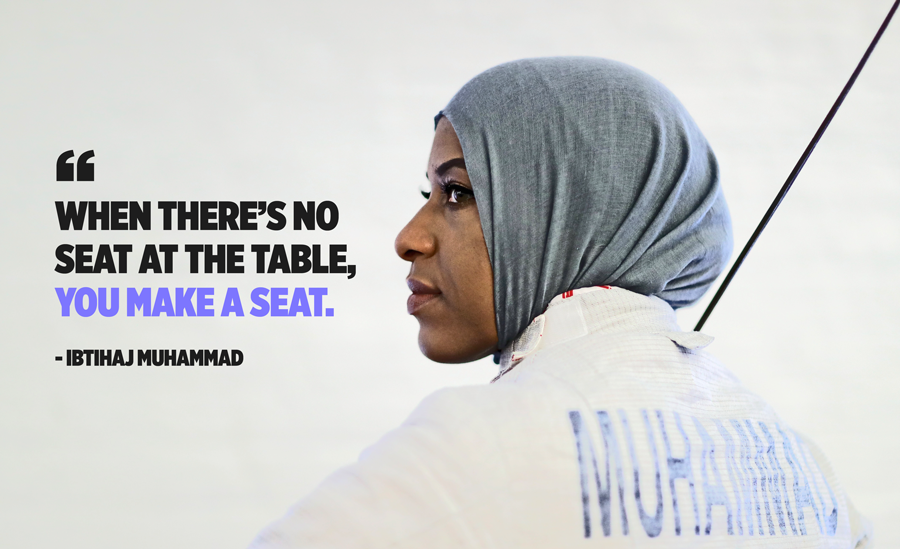Muslim Olympic fencer Ibtihaj Muhammad was once kicked out of a fabric store because of her hijab
“American Beauty” is a new series in which Yahoo Lifestyle takes a virtual cross-country journey to discover what beauty means — reimagining the American flag through the diverse group of faces that make up the United States of America. For our first installment, we’re focusing on Muslim-American women, highlighting what makes this group unique while showcasing the common threads that bring us together. In this edition of “Inspired By,” Olympic fencer Ibtihaj Muhammad explains the trials and triumphs of being a black Muslim woman in the world of sports.
In 2016, New Jersey native Ibtihaj Muhammad made history as the first Muslim woman wearing a hijab to represent the U.S. at the Olympics. Walking away with a bronze medal in Rio de Janeiro with her women’s saber team, Muhammad became a household name overnight, breaking barriers not only as a female in sports, but also as a black Muslim woman who proved that religion isn’t a barrier for sports.
Even though we’re in 2018, seeing women dominate in sports can still feel like a battle of the sexes: Women are scrutinized about their appearance and physicality more than men; and especially when it comes to women of color in sports, there’s an unspoken yet understood racial disparity in resources and funds. Yet, we’ve seen black women push past these obstacles and go on to inspire an entire generation of young athletes: There’s Venus and Serena Williams, two sisters who commanded the tennis game. There was Marion Jones, who took home five medals at the 2000 Summer Olympics in Sydney, being named the fastest woman in the world. We know the impact of Olympic gymnasts Gabby Douglas and Simone Biles, and the list goes on and on.
Muhammad didn’t just have the obstacles of race to consider in her athletic quest to be an Olympic fencer, she also had religious ones. “There were some difficult moments growing up being one of the only girls in hijab in my town,” she told Yahoo Lifestyle, noting that a hijab is a religious covering that women can choose to wear. “Fencing just kind of uniquely accommodated my religious beliefs. The athletes wear long jackets and they wear long pants,” she said.
However, she soon realized that while the sport offered her opportunity because of its dress requirements, it offered very little else when it came to diversity. She explained, “Not only did I realize there had never been a woman of color to represent the United States saber team, but there had never been a Muslim woman in hijab to represent the United States Olympic team at all.”

The impact on the world of being a Muslim woman in hijab on a sports team probably can’t be fully articulated, but Muhammad made sure to point out that her achievement has not come easily. She has frequently spoken out on instances in which she experienced racism or prejudice from her U.S. fencing teammates and coach, noting that remarks were even made about her diminshed performance during Ramadan, the Muslim holy month when fasting is observed. This isn’t something that she has faced exclusively in sports, either: “I was kicked out of a fabric store with no explanation other than ‘Your business isn’t welcome here.’”
However, Muhammad has met this with grace and compassion, using her voice to bring awareness to issues of race, culture, and, of course, religion. She’s won accolades for being the first Muslim woman in a hijab in sports, but she knows that there is work to be done on the perception of Muslims and Islamophobia in America. She said, “I can’t sit here as the first Muslim woman to represent the United States at the Olympic Games and be numb on these issues that directly affect me.”
A post shared by Ibtihaj Muhammad (@ibtihajmuhammad) on Jun 22, 2018 at 12:10pm PDT
In her recently published book, Proud: My Fight for an Unlikely American Dream, Muhammad describes other hurtful experiences. Throughout the book, she discusses how fencing (and many sports in general) can be exclusive to those who can afford the costs involved. When discussing accessibility to sports, she makes a point to note that fencing is not a “white” sport, but rather a sport that probably very few who don’t come from an affluent background can afford. This discussion still centers around race, but it targets the financial aspect, and how race doesn’t determine how good one can be in a sport, but the inability to pay for it can.
The necessity of breaking barriers in a sport that fundamentally is set up to keep you out is what makes Muhammad’s story so affecting, so needed, and so celebratory. Regardless of what the critics say, the threats and the disapproval, and the speed bumps that every great athlete is bound to hit at one point or another, Muhammad is not planning on slowing down for herself or for others. “When there’s no seat at the table, you make a seat and say, ‘This is a place that needs to be inclusive.’” She’s starting with sports, but this is a tune we can all sing.

